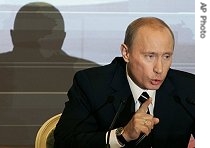2007年VOA标准英语-President Putin's Remarks About America - Misim(在线收听)
By Peter Fedynsky
Washington
22 February 2007
watch Putin Speech report
Recent harsh criticism of the United States by Russian President Vladimir Putin has raised questions about Kremlin intentions and the state of bilateral relations between Washington and Moscow. Here with details is VOA's Peter Fedynsky.
Speaking in Germany at the recent Munich Conference on Security Policy, Russian President Vladimir Putin accused the United States of imposing its economic, political, cultural and educational policies on other nations.
 |
| Russian President Vladimir Putin, 1 Feb 2007 |
In Washington, President Bush said Mr. Putin remains the same strong-willed person that he was in 2001, when Mr. Bush pronounced his Russian counterpart trustworthy. "He is a person with whom I have had agreements and disagreements throughout the course of my presidency and his. We've disagreed on the utility of NATO. I've tried to convince Vladimir that NATO is positive. It's a positive influence that democracies on your border are good things to have. The democracies tend not to fight each other."
After his speech, President Putin described Mr. Bush as a decent person and expressed agreement that Russia and America will never be opponents again.
Nonetheless, the Kremlin leader believes NATO is a serious provocation that is helping create a virtual division of Europe, similar to the Berlin Wall during the Cold War period.
Lithuanian President Valdus Adamkus, whose country joined NATO after a half century under Soviet domination, dismisses Mr. Putin's Munich speech. "I believe this is not going to sway the free people from, I mean, its ideals, the direction we are going together. And I think the final outcome will be -- this is what we dream about, this is what the American people stand for, for centuries."
Mr. Bush notes that the United States and Russia have common interests in the security of their peoples and the world.
But Ariel Cohen, a Russia expert at the Heritage Foundation think tank in Washington, DC, says Mr. Putin is playing on anti-American sentiments in Europe and the Middle East to undermine global security. "And of course that helps for Putin when he goes to the Middle East to sell nuclear reactors, to sell weapons; the billions of dollars worth of weaponry that Russia offered to the Arab market was quite noticeable."
Mr. Putin also accused the Organization for Security and Cooperation in Europe, or OCSE, of meddling in the internal affairs of member states. But the immediate past president of the OSCE parliamentary assembly, U.S. Congressman Alcee Hastings, says the organization's agreement specifically allows monitoring. "Let me read: "Categorically and irrevocably, the countries, the participating states, including Russia and the United States, irrevocably declare that commitments undertaken in the field of the human dimension are matters of direct and legitimate concern to all participating states and do not belong exclusively to, quote, "the internal affairs of the state concerned."
The former U.S. representative to the United Nations, Ambassador John Bolton, says he does not understand the reasons behind President Putin's speech. "Because it does not reflect the real status of the bilateral relationship and many areas of cooperation we have, or the assurances that we have provided over the years about such things as missile defense, which are not aimed against Russia, or Russia's nuclear capability, but aimed to protect the United States from strikes by rogue countries like Iran or North Korea."
Ambassador Bolton says the Munich speech indicates that the United States has more diplomatic work to do with Russia. Bolton also expresses hope that President Putin's remarks represent a misimpression about the United States, and not a change in Russian policy.